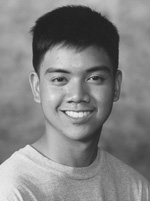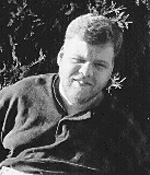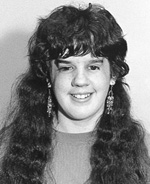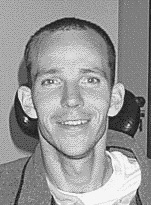DO-IT Profiles
Here's your chance to learn more about the participants in DO-IT.
DO-IT Scholar Profile

by Jeffrey
My name is Jeffrey. I'm a senior at Tyee High School where I am second-year President of the Tyee Sign Language Club and second-year co-editor of the deaf and hard-of-hearing newsletter. My favorite hobbies are basketball, skiing, and bowling. I have also been in the deaf youth drama program for five years. This program helps me improve my facial expressions and the quality of my communication with others. This year, I played Fred in the comedy, "I Deaf Lucy." I will attend the Rochester Institute of Technology this August. I am very interested in studying computer engineering technology. I would like to learn computer languages such as HTML, Visual, and other programs.
DO-IT Ambassador Profile

by Anthony
Hello, I'm Anthony from Grand Forks, North Dakota. I was in the DO-IT Scholars program the second year of the actual program (back in the dinosaur age I sometimes say jokingly). I have Cerebral Palsy. I like to explain my whole life as a computer system with lots of different parts all wired together to make something great. To me, DO-IT is like a computer chip inside me. Who I am and what I do today are partially because of DO-IT. I'm twenty-three years old and already have my dream job working at the Prentke Romich Company (PRC), where we build and support communication devices with voice output for people with severe speech disabilities, such as my own. I work in the technical service department answering phone calls at night time and weekends, when PRC is usually closed. I also help them with promoting and selling devices at conferences because, we have found, who better to talk about the benefits of communication devices and assistive technology than somebody who actually uses it every day of his life.
When I'm not on PRC time, I'm usually offering families the assistive technology support they need in order to make sure their child with a disability has a great life. I do all I can to see that their goals and dreams are reached in life. I still have lots of dreams of my own. One of these dreams is to someday see another FDR in a wheelchair run for president using today's assistive technology to help him do his job. Who knows, it might be somebody in DO-IT. All I ask is if you make it, please remember that we love to party and we want to party with you in Washington DC the night you take office!
DO-IT Careers Profile

by Anna
I do not know how many times I have felt a crystal bell or a wonderfully textured piece of clothing, and called in excitement to my mother, "Mom, come here. You have to feel this!" only to have her reply, "Yes Anna, I can see it." The implication here to me is that sight is a superior or all-inclusive sense. This automatically decreases the other senses to a level of lesser importance. Yet, I remain convinced that seeing a texture and feeling a texture are not the same, just as seeing a cube and feeling a cube are not equivalent experiences.
When I was in my high school biology class, we watched a film about the senses or sight or some such thing, and I remember the narrator stating that people receive 97% of their input through vision. I was astounded! If this was true, how could I function at all without sight? As it is, I do far more than merely function; I live. I walk to the store, ride the bus, and cook food. I play with my dogs, read books, listen to music, and spend time with friends. I draw, write, and study a martial art. If vision is such a predominant sense, how can I do all of these things and more?
Some time after the film in biology, a teacher explained to me that sighted people take in such a large amount of information through their eyes, that they tend to tune out information received through the other senses. This does not mean, however, that each sense does not have something special to offer. I enjoy listening to the bubble or roar of fountains, but I cannot hear the light reflecting off the water. I love the feel of wading through piles of dry leaves during the fall, but I cannot touch the variety of colors that the leaves turn while still on the trees. Just as sight cannot tell other people everything about the world they live in, touch and sound cannot tell me everything. The difference is that I have to pay more attention to my other senses because I cannot rely on vision. As I often tell people who ask me if I have superior hearing because I am blind, it is not that I hear better than sighted people, but that I am more aware of what I do hear out of necessity.
This year I began doing presentations for DO-IT's Show and Tell program (see related article). I have tried to encourage the children to think about their other senses. I do not want them to grow up thinking that their senses are redundant, but that each sense has something unique to offer. I ask them if they can think of ways to tell an apple and banana apart by touch, and suggest that they ask their parents to let them feel different kinds of produce at the grocery store. I talk to them about how I use my feet to feel different textures on the ground; how I hold a hand above a burner to feel whether it is on or not by the heat; and about how I use my hearing to watch television, detect oncoming cars, cross streets, and distinguish between different people's voices. I try to impress upon them the idea that all of the senses can be used to help us understand and negotiate the world in which we live. By encouraging children to use all of their senses, I am giving them the tools to remain in contact with their environment. By introducing them to all of their senses, I am introducing them to a multilayered universe in which seeing a texture and feeling a texture can be blended into a richer experience.
DO-IT Mentor Profile

by Greg Smith
I have been involved with the DO-IT program as a mentor for about 5 years. I grew up mostly overseas (five years in Germany and six years in Japan) because my dad was in the U.S. Foreign Service, but now Seattle (or at least the Eastside) is my home. I am a C-5 quad (injured playing football my sophomore year at Stanford University in California).
I got my bachelor's and master's degrees in computer science and have been working as a programmer (or 'Software Design Engineer' as they like to call it) for Microsoft for about 6 1/2 years. I use a headset mouse, but other than that I have required remarkably little in the way of accommodation to allow me to work at the same level as the other programmers here. I think it is a good illustration that the software industry can be an excellent fit for people with disabilities. Up until recently I had been working on Microsoft's Data Access Components for Windows and Office (more info at learn.microsoft.com/en-us/previous-versions/ms810805(v=msdn.10)?redirectedfrom=MSDN). But I decided I needed a change from the product groups, and so, this past September, I took a totally different job with Microsoft Research (research.microsoft.com). I now work in the Computer Vision group, trying to get computers to "see" their surroundings and working on the smart home of the future-it is really great fun. We have a "laboratory" set up like a living room, with cameras that try to keep track of who is in the room and what they might want to do so the computers can help do those things automatically.
The other big news in my life is that during my recent vacation to Las Vegas for my birthday I got engaged! Janna, my fiancée, is graduating from medical school this year and hopefully will be a doctor in residency at the University of Washington this fall. Obviously, it has been a very busy few months...I hope to meet more of you online-I'm looking forward to hearing from you!